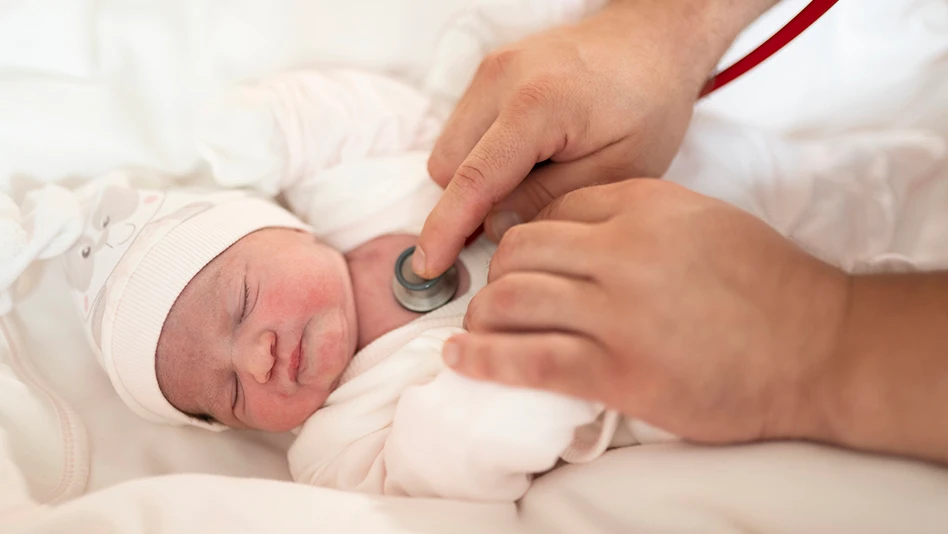
CREDIT: MAKE YOUR MEDICAL DEVICE PITCH FOR KIDS!
Ten medical technology innovators focused on pediatric cardiology have been selected to compete for $300,000 in grants in the Make Your Medical Device Pitch for Kids! competition on Oct. 14 in Toronto, Canada.
The competition is presented by the Alliance for Pediatric Device Innovation (APDI), a nonprofit consortium led by Children’s National Hospital and funded through the Food and Drug Administration (FDA), and Additional Ventures, a nonprofit focused on accelerating research progress and improving clinical care for individuals born with single ventricle heart defects. Selected by an internal committee, ten finalists will compete for up to $50,000 each in grant funding and opportunities to access support services and technical expertise provided by APDI and Additional Ventures, including engineering, regulatory, reimbursement, clinical trials study design, and data science services.
According to the Centers for Disease Control and Prevention, about 40,000 children are born annually with a congenital heart defect. Children with heart conditions need medical devices tailored to their specific physiological needs. There is a significant unmet need for pediatric devices designed to monitor and treat young patients effectively in cardiology, interventional cardiology, cardiac surgery and electrophysiology. This competitive grant program is designed to identify and support the development and commercialization of devices that can address these needs.
The following finalists will compete in the cardiology edition of the Make Your Medical Device Pitch for Kids! competition:
- Bloom Standard, Minneapolis, Minn. - Autonomous, hands-free ultrasound
- Compremium AG, Bern, Switzerland – Noninvasive central venous pressure estimation for pediatric patients
- Kardio Diagnostix, Halifax, Nova Scotia – Artificial intelligence-driven heart auscultation platform
- Massachusetts Institute of Technology, Cambridge, Mass. – Polymeric auxetic stent to treat pediatric aortic coarctation
- OxiWear, Arlington, Va. – Home measurement of oxygen levels in pediatric congenital heart disease
- PyrAmes Inc., Cupertino, Calif. – Improved, wearable noninvasive pediatric blood pressure monitor
- Rhaeos, Evanston, Ill. – Wireless noninvasive sensors to continuously monitor cardiac output
- SeeMedX, Las Vegas, Nev. – Noninvasive, continuous hemodynamic monitoring
- Sibel Health, Chicago – Hospital-to-home monitoring for pediatric heart conditions
- University of California, Irvine, Calif. – Humanitarian device exemption for growth-accommodating IRIS™ TPVR system
"There's a profound market failure in the development of medical devices for pediatric heart patients," says Kolaleh Eskandanian, Ph.D., M.B.A., vice president and chief innovation officer at Children's National Hospital, and program director and principal investigator of the APDI. "Not only are existing technologies often suboptimal adaptations of adult devices – lacking in accuracy, safety, and comfort for children – but in many cases, essential pediatric-specific technologies are entirely absent. This program empowers us to address this critical void by supporting the creation of innovative devices designed exclusively for children, providing the necessary funding and expertise to help innovators successfully navigate the complex journey of bringing new pediatric devices to market."
The competition is a highlight of the 12th Annual Symposium on Pediatric Device Innovation, presented by Children’s National Oct. 14. The symposium, which co-locates with The MedTech Conference powered by AdvaMed, brings together industry-leading experts from across the medical technology sector for multidisciplinary panel discussions focused on critical issues in pediatric device development, regulatory and reimbursement processes, device clinical trials and pediatric healthcare innovation gaps.
“For too long, innovation in pediatric cardiovascular devices has been deprioritized, and with it, funding has stagnated,” says Additional Ventures CEO Kirstie Keller, Ph.D. “We are proud to partner with APDI to support the critical need to develop and commercialize new technologies that are designed and built for children and are encouraged by the caliber of the ten groups selected to compete. We look forward to seeing these and other breakthroughs reach patients and revolutionize how we treat and monitor children.”
APDI is one of five nonprofit consortia in the FDA’s Pediatric Device Consortia grant program that receives funding to provide a platform of services, expertise and grants to support pediatric innovators in bringing medical devices to the market that specifically address the unmet needs of children. Led by Children’s National, APDI partners include Johns Hopkins University, CIMIT at Mass General Brigham, Tufts Medical Center, MedStar Health Research Institute, MedTech Color, and OrthoPediatrics Corp.
Latest from Today's Medical Developments
- Arcline to sell Medical Manufacturing Technologies to Perimeter Solutions
- Decline in German machine tool orders bottoming out
- Analysis, trends, and forecasts for the future of additive manufacturing
- BlueForge Alliance Webinar Series Part III: Integrate Nationally, Catalyze Locally
- Robot orders accelerate in Q3
- Pro Shrink TubeChiller makes shrink-fit tool holding safer, easier
- Revolutionizing biocompatibility: The role of amnion in next-generation medical devices
- #56 Lunch + Learn Podcast with Techman Robot + AMET Inc.





